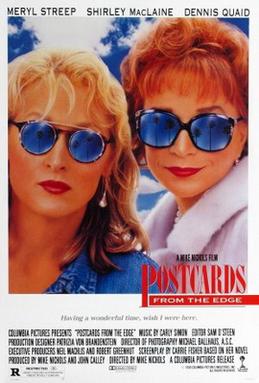Box office
The film opened in 1,013 theaters in the United States and Canada on September 14, 1990, and grossed $7,871,856 during its opening weekend, ranking number one at the US box office. [5] It eventually grossed $39,071,603 in the US and Canada [6] and $24.3 million internationally, [7] for a worldwide total of $63.4 million.
Critical response
On the website Rotten Tomatoes, the film holds an approval rating of 83% based on 87 reviews, with an average rating of 7.4/10. The website's critics consensus reads, "Uniting a pair of powerhouse talents with a smart, sharply written script, Postcards from the Edge makes compelling drama out of reality-inspired trauma." [8] Metacritic, which uses a weighted average, assigned the film a score of 71, based on 18 critics, indicating "generally favorable" reviews. [9] Audiences polled by CinemaScore gave the film an average grade of "A−" on an A+ to F scale. [10]
Vincent Canby of The New York Times said the film "seems to have been a terrifically genial collaboration between the writer and the director, Miss Fisher's tale of odd-ball woe being the perfect material for Mr. Nichols's particular ability to discover the humane sensibility within the absurd." [11]
Roger Ebert of the Chicago Sun-Times observed, "What's disappointing about the movie is that it never really delivers on the subject of recovery from addiction. There are some incomplete, dimly seen, unrealized scenes in the rehab center, and then desultory talk about offscreen AA meetings. But the film is preoccupied with gossip; we're encouraged to wonder how many parallels there are between the Streep and MacLaine characters and their originals, Fisher and Debbie Reynolds... Postcards from the Edge contains too much good writing and too many good performances to be a failure, but its heart is not in the right place." [12]
Hal Hinson of The Washington Post said, "Meryl Streep gives the most fully articulated comic performance of her career, the one she's always hinted at and made us hope for." He felt the film's earlier section was "the movie's best, primarily because Nichols is so focused on Streep. In fact, almost nothing else seems to matter to him... But while Nichols is servicing his star, he lets the other areas of the film go slack... [He] is finely attuned to the natural surreality of a movie set, but when he moves away from the show-biz satire and concentrates on the mother-daughter relationship, the movie falters." [13]
